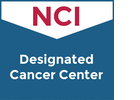Kidney Cancer
Kidneys are bean-shaped organs about the size of a fist, one on each side of the spine in the upper abdomen. Kidney cancer usually starts in small tubes within the kidneys, which filter blood from the renal arteries and remove excess water, salt, and waste. Many people can live normally with just one kidney.
Kidney malignancies are included in a group known as genitourinary (GU) cancers, and Wilmot offers the most comprehensive and advanced care for GU cancers in the Finger Lakes region. Wilmot also has a widely respected research program in Urology and GU cancers.
Kidney cancer types
By far the most common is renal cell carcinoma (RCC), causing about nine out of 10 cases. Several subtypes of renal cell carcinoma exist: clear cell (the most common form of RCC), papillary, chromophobe, and five other very rare subtypes that make up less than one percent of all renal cell carcinomas. Other types of kidney tumors are transitional cell carcinoma, Wilms tumor (the most common type in children), and renal sarcoma, which begins in the connective tissue or blood vessels around the kidneys. This section refers mostly to renal cell carcinoma.
Kidney cancer facts
About 62,000 cases are diagnosed annually in the U.S. The lifetime risk of developing kidney cancer is about one in 63, and men are twice as likely as women to get it. The rate of new cases had been rising for the past 15 years, but it's not clear why and the increase is starting to level off, according to the American Cancer Society.
Causes and risk factors
Kidney cancer mostly occurs in older adults. Smoking, inherited disorders, and misusing certain non-prescription pain medications for long periods can increase the risk. More on risk factors:
- Smoking boosts the risk of RCC and even more so for transitional cell carcinoma, and the risk seems to be related to how much a person smokes. Quitting helps, but it takes years to completely erase the risk.
- The pain reliever most often linked to kidney cancer is phenacetin, but this medication is no longer available in the U.S. Still, it's important to avoid misuse of pain medications to reduce the risk particularly of transitional cell carcinoma.
- Obesity and being overweight might cause changes in hormones linked to kidney cancer.
- Genetic conditions predispose some people to kidney cancer. These include: von Hippel-Lindau disease (which is characterized by developing tumors or cysts all over the body and clear cell RCC at a younger age); hereditary papillary RCC; hereditary leiomyoma RCC (which is characterized by small smooth-muscle tumors in the skin and uterus of women); Birt-Hogg-Dube syndrome (which leads to developing many small, benign skin tumors); and Familial Renal Cancer (which tends to cause kidney cancer before age 40 and tumors of the head and neck region).
- Family history, particularly among brothers and sisters.
- High blood pressure, although studies are mixed on whether it's the condition that boosts the risk of kidney cancer or some of the drugs used to treat blood pressure, including diuretics.
Prevention
It's not clear exactly how gene changes in the kidneys promote cancer or how it can be prevented. Even when a person has one of the known, inherited genetic conditions listed above and can be watched closely, it may not be possible to prevent kidney cancer. Still, smoking is responsible for a large number of cases so it's important to quit or not smoke at all. Maintaining a healthy weight, eating a lot of fruits and vegetables, controlling high blood pressure, and avoiding exposure to workplace toxins such as cadmium and organic solvents might also reduce the risk.
Reduce Your Risk
Smoking is a significant risk factor for bladder cancer. Wilmot's Tobacco Cessation Program can help you quit.

